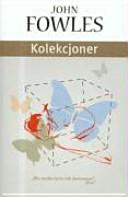Dzieło
A Maggot
John FowlesJohn Fowles słynne cytaty
„Mowa jest jak jedwabna mora – tak wiele zależy od kąta, pod jakim się na nią patrzy.”
Kochanica Francuza
Źródło: s. 522
„Pragnienie posiadania czegoś i pragnienie rozkoszowania się czymś unicestwiają się wzajemnie.”
The desire to hold and the desire to enjoy are mutually destructive. (ang.)
Kochanica Francuza
Źródło: s. 85
John Fowles Cytaty o uśmiechu
John Fowles Cytaty o życiu
Life (...) is not a symbol, is not one riddle and one failure to guess it, is not to inhabit one face alone or to be given up after one losing throw of the dice; but is to be, however inadequately, emptily, hopelessly into the city's iron heart, endured. And out again, upon the unplumb'd, salt, estranging sea. (ang.)
Kochanica Francuza
Źródło: s. 531–532
John Fowles cytaty
Hebanowa wieża
Kochanica Francuza
Źródło: s. 153, 154
Kolekcjoner
Kochanica Francuza
Źródło: s. 114, 115
„Mężczyźni mówią, że to Ewa kusi ich do burdelu, lecz Adam ją tam trzyma.”
Źródło: Larwa (ang. A Maggot; 1985), tłum. Irena Doleżal-Nowicka
Dlatego nie możemy planować. Wiemy, że świat nie jest maszyną, lecz organizmem. Wiemy również, że świat stworzony rzetelnie musi być niezależny od swego twórcy – zaplanowany świat (taki, w którym widać wyraźnie, że go zaplanowano) to świat martwy. Gdy nasze postacie i wydarzenia przestają nas słuchać, wtedy dopiero zaczynają żyć prawdziwym życiem.
Kochanica Francuza
Źródło: s. 114, 115
John Fowles: Cytaty po angielsku
“I'm not really sorry. But I'm not absolutely unsorry.”
Źródło: The Collector
“We all write poems; it is simply that poets are the ones who write in words.”
Źródło: The French Lieutenant's Woman
“When you draw something it lives and when you photograph it it dies”
Źródło: The Collector
“There is only one good definition of God: the freedom that allows other freedoms to exist.”
Źródło: The French Lieutenant's Woman (1969), Ch. 13, p. 99
“I knew I would always want to go on living with myself, however hollow I became, however diseased.”
Daniel Martin (1977)
Źródło: The Magus
Kontekst: I saw that I was from now on, for ever, contemptible. I had been and remained, intensely depressed, but I had also been, and always would be, intensely false; in existentialist terms, inauthentic. I knew I would never kill myself, I knew I would always want to go on living with myself, however hollow I became, however diseased.
“But forgetting's not something you do, it happens to you. Only it didn't happen to me”
Wariant: Forgetting’s not something you do, it happens to you. Only it didn’t happen to me.
Źródło: The Collector
The Aristos (1964)
Kontekst: The artefacts of a genius are distinguished by rich human content, for which he forges new images and new techniques, creates new styles. He sees himself as a unique eruption in the desert of the banal. He feels himself mysteriously inspired or possessed. The craftsman, on the other hand, is content to use the traditional materials and techniques. The more self-possessed he is, the better craftsman he will be. What pleases him is skill of execution. He is very concerned with his contemporary success, his market value. If a certain kind of political commitment is fashionable, he may be committed; but out of fashion, not conviction. The genius, of course, is largely indifferent to contemporary success; and his commitment to his ideals, both artistic and political, is profoundly, Byronically, indifferent to their contemporary popularity. <!-- no. 61
“I know what I am to him. A butterfly he has always wanted to catch.”
The Collector (1963)
Kontekst: I know what I am to him. A butterfly he has always wanted to catch. I remember (the very first time I met him) G. P. saying that collectors were the worst animals of all. He meant art collectors, of course. I didn’t really understand, I thought he was just trying to shock Caroline — and me. But of course, he is right. They’re anti-life, anti-art, anti-everything.
The Aristos (1964)
Kontekst: The artefacts of a genius are distinguished by rich human content, for which he forges new images and new techniques, creates new styles. He sees himself as a unique eruption in the desert of the banal. He feels himself mysteriously inspired or possessed. The craftsman, on the other hand, is content to use the traditional materials and techniques. The more self-possessed he is, the better craftsman he will be. What pleases him is skill of execution. He is very concerned with his contemporary success, his market value. If a certain kind of political commitment is fashionable, he may be committed; but out of fashion, not conviction. The genius, of course, is largely indifferent to contemporary success; and his commitment to his ideals, both artistic and political, is profoundly, Byronically, indifferent to their contemporary popularity. <!-- no. 61
The Collector (1963)
Kontekst: I don’t think the Campaign for Nuclear Disarmament has much chance of actually affecting the government. It’s one of the first things you have to face up to. But we do it to keep our self-respect to show to ourselves, each one to himself or herself, that we care. And to let other people, all the lazy, sulky, hopeless ones like you, know that someone cares. We’re trying to shame you into thinking about it, about acting.
“We all want things we can't have. Being a decent human being is accepting that.”
Źródło: The Collector
“I am infinitely strange to myself.”
Źródło: Charles to Sarah in Ch. 47, p. 340 note: The French Lieutenant's Woman (1969)
“The most important questions in life can never be answered by anyone except oneself.”
Źródło: The Magus
“It is only when our characters and events begin to disobey us that they begin to live.”
Źródło: The French Lieutenant's Woman
“The ordinary man is the curse of civilization.”
Źródło: The Collector
